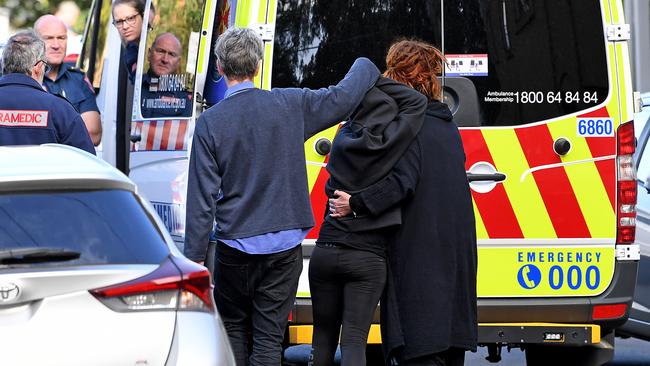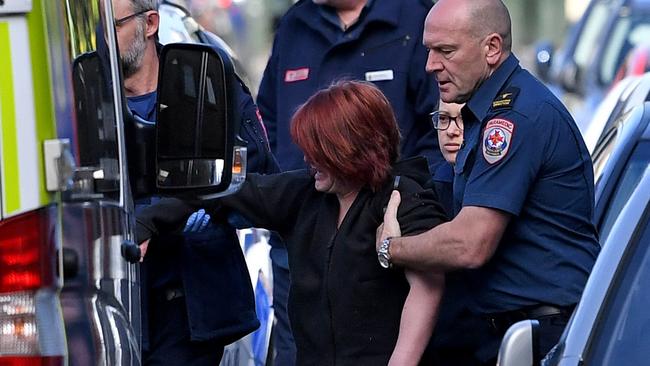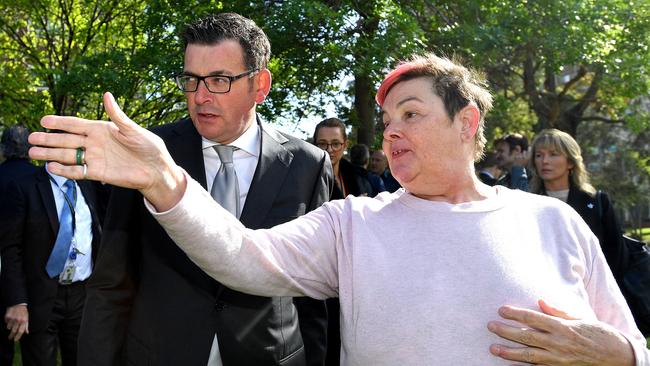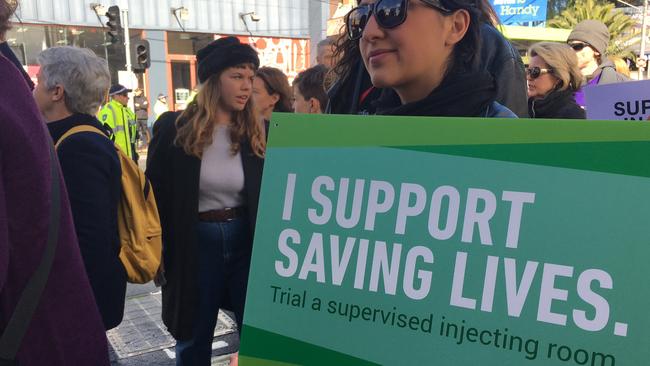Victoria to trial supervised drug injection room amid heroin crisis
THE second safe injecting room is set to be opened in Australia. This is what happens inside the controversial centres.
News
Don't miss out on the headlines from News. Followed categories will be added to My News.
A WOMAN was treated for a suspected drug overdose just metres from where Victorian Premier Daniel Andrews was announcing a trial of the state’s first supervised heroin injection centre.
Paramedics who had gathered at the park in one of Melbourne’s inner suburbs where the announcement was being made rushed to the aid of the woman when she collapsed in a nearby street.
The safe injection room will be located in the overdose hotspot of North Richmond in Melbourne and will provide addicts with a safe space to take heroin where doctors and counselling services are on hand.
Legislation to open the room at the North Richmond Community Health Service is set to be introduced to State Parliament this week.
The Victorian Labor government had previously opposed introducing an injection room but the increasing number of heroin-related deaths prompted the decision change, Mr Andrews said.


It followed 34 heroin-related deaths in the North Richmond area in 2016, and a parliamentary inquiry that found the heroin problem in the suburb had reached ‘crisis’ levels.
“Thirty-four people who have died lonely terrible, terrible deaths. Many of which could have been prevented, perhaps all of which could have been prevented,” Mr Andrews said in his announcement to the media.
He said the opening of the injection centre wouldn’t be able to go ahead without the support of the police and ambulance service behind it.
“I wouldn’t be doing this if I didn’t have the complete support of the Victorian Police, Ambulance Victoria, as well as support from groups like the AMA (Australian Medical Association) and others who spend their entire time working to support those who are addicted to heroin and other drugs,” Mr Andrews said.

The injection centre, which will have a two-year initial trial starting in June 2018, will be the second of its kind in Australia, with the first being set up in 2001 in Sydney’s Kings Cross.
The trial will be part of a $87 million drug rehabilitation plan, which includes more treatment facilities and tougher penalties for heroin trafficking.
The program will be modelled off Sydney’s Uniting Medically Supervised Injecting Centre (MSIC), which was the first centre of its kind in the English speaking world when it opened.
Uniting MSIC medical director Dr Marianne Jauncey said the introduction of a centre in Victoria was a “good decision that will save lives”.
“We certainly welcome the announcement from Victoria that they will respond appropriately and sensibly to the increasing deaths from overdoses,” she told news.com.au.
According to multiple independent evaluations of the centre, the number of ambulance call-outs to Kings Cross reduced by 80 per cent since the MSIC opened.
“We get roughly 160 visits a day and 600 to 700 individuals a month. We continue to register on average one new person a day,” Dr Jauncey said.
The staff at the centre have managed more than 7400 overdoses without a single death.
This is Aaron. His mum Cherie says he would still be alive today if he had access to a supervised injecting room. And I believe her. pic.twitter.com/cW1znYxPLc
— Daniel Andrews (@DanielAndrewsMP) 30 October 2017
WHAT HAPPENS INSIDE THE CENTRE
Step One: Clients don’t have to book an appointment to use the centre and can remain anonymous if they wish.
When they first enter they sit down with staff who will assess their current situation, medical history and eligibility to access the service.
To be eligible clients have to meet the following criteria:
- Be an injecting drug user
- Be 18 years of age or over
- Not be pregnant or accompanied by a child
- Not be intoxicated
“We don’t require them to provide us with identifying details. It is very important that we are a non-judgemental service that anybody can access,” Dr Jauncey said.
“We ask them what drugs they intend on using and what drugs they have in their system, so we can have an idea of what to expect when they enter the other room.”
Step Two: If they meet the criteria, clients are then allowed to enter the injecting room.
The Uniting MSIC in Kings Cross has eight booths that can seat two people and a staff member, including a registered nurse, who are on hand to keep an eye on things.
Clients are provided with clean equipment and are given advice on safer injecting practices.
“We provide them with clean injecting equipment and rather than giving it to them and then sending them away, people are welcome to do what they do in a clean and sanitary environment,” Dr Jauncey told news.com.au.
There are waste bins and a resuscitation room, which is used to treat people who are overdosing.
Dr Jauncey said since the centre has been opened, the number of needles found on the streets had plummeted because users were able to dispose of them at the centre.

Step Three: Once clients had finished injecting they were taken into the after care area where they could stay until they were ready to leave.
Tea and coffee was available and staff provided clients with information about other services like housing, legal, social welfare, drug treatment and rehabilitation services.
Dr Jauncey said the Uniting MSIC was not much different from a typical health centre in terms of how clients were treated and how they responded to the service.
“It is just like a pretty typical health service. People come in on a voluntary basis, they are treated with respect and the response is usually positive,” she said.
“People thank us for treating them like a human being. I think stigma and shame stop a lot of people from asking for help. These types of services can improve people’s access to care.”
Originally published as Victoria to trial supervised drug injection room amid heroin crisis


